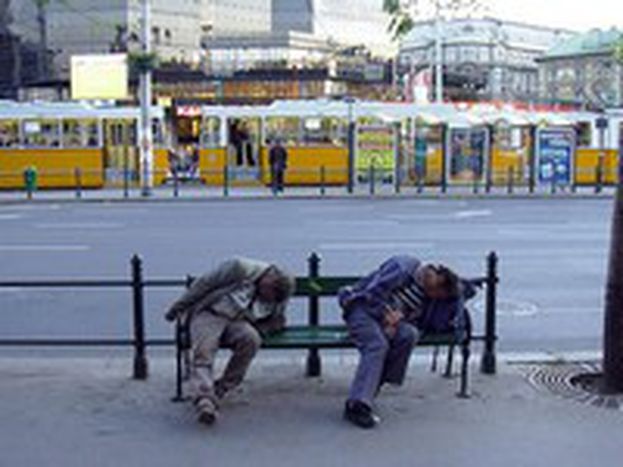
Budapest: my solidarity nights
Published on
Translation by:
Nabeelah ShabbirFor the fourth year in a row, demonstrators spend a night in a metro station underground passage to highlight their solidarity with the capital's nearly 30, 000 Hungarian homeless
Neon signs at Budapest West railway station. The homeless lie on mattresses. Rastafarians drum, dodgy figures dance. They demand a 'life in dignity for all.' Masses of people are pouring out from the metro shafts around them. From the corner of your eye you can see a din going on amongst cloaked bundles. Cupped hands wave in the air, dogs stray around. Passengers leaving the metro look eager to move away from the scene.
But the energetic protest by the almost 100 homeless people, activists and social workers manages to pervade the trafic. The neon lights of various signs attract their shy attention; signs pained by street kids for the fourth annual 'Night of Solidarity' in Budapest, held on 14 November. All of a sudden the gap between no-mans-land and someones-land has been bridged.
Solidary: social minister
Bálint uad Katalin, two young activists in the Hungarian network 'People on the Street', are giving a speech. They are demanding that the state and city's administration of Budapest remove the reductions in social matters. They want more social housing in the capital and more means to improve education and occupational measures. They protest against a decision the administration took a week ago in a district of the city, where the police can remove the homeless from the street from the beginning of 2008.
These young people demand respect for the basic right to housing, recognised in the constitution. Pastor Gábor Iványi from the homeless asylum 'Refuge' says 'homelessness isn't a result of a lack of means, but a lack of respect.' Gulasch soup, used shoes and clothes are being passed around. It's a party of 'tramps', who seek shelter in the autumn from the main island and parks in the underworld of the city.
The Socialist minister for social issues, Mónika Lamperth, is also milling amongst the beggar crowd. 'I had my vesicle bladder taken out because I drink. I can't find work. Please, help me,' a toothless thirtysomething man begs her.'Why drink?' retorts Lamperth. 'It's not possible to survive in the cold without alcohol.' The minister goes on: 'Social workers can always help you to try and free yourself of this way of 'warming youself up'. Write me down your telephone number and we will help you.' But the problem is that the man doesn't own a phone.
Save at the price of people
Since 2006, the goverment has reduced budget expenditure by 5% to overcome rising debts. The Hungarian economy is in crisis and inflation is high, with qualified perople just about able to find work. The parliament of the city of Budapest contributes to a new savings policy – in 2006 alone outgoings for social facilites was cut to 1.8 million euros and then again to 5.2 million in 2007.
The losers of this policy are those who don't know how to help themselves. Firstly the state pays unemployment for up to six months and after that provides meek social support. The sum of 80 – 120 euros per person is not enough to rent a room. Many immigrants don't receive this support because they buy their documents on the black market for a few euros, explains Róbert Képe, social worker in a hostel called 'Humanitarian Movement.' After their first two years they found it difficult to bring people in from the street, who become accustomed to this sedentary way of life.
With the end of the communist regime, worker residences were closed down. Since that time, seventeen years ago, thousands of Hungarians have lived on the streets, jobbing occasionally. At the moment 30, 000 people are estimated to be homeless in Budapest. The majority of these don't find a place to sleep in homeless refuges. According to Képe, the state needs to invest much more money to lodge all these people. In place of this, 'tramps' huddle together between cardboad boxes and blankets in front of commercial centres and metro alleys. Meanwhile it's getting dark at West Station. The protest quietens under the humming of the neon lights. With the silence, the cold reigns the streets of the capital.
Translated from Budapest: Überleben im Transit



